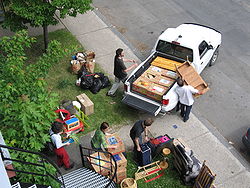
Moving Day
Encyclopedia

Quebec
Quebec or is a province in east-central Canada. It is the only Canadian province with a predominantly French-speaking population and the only one whose sole official language is French at the provincial level....
, Canada
Canada
Canada is a North American country consisting of ten provinces and three territories. Located in the northern part of the continent, it extends from the Atlantic Ocean in the east to the Pacific Ocean in the west, and northward into the Arctic Ocean...
, dating from the time when the province used to mandate fixed terms for leases of rental properties. It falls on July 1, which is also Canada Day
Canada Day
Canada Day , formerly Dominion Day , is the national day of Canada, a federal statutory holiday celebrating the anniversary of the July 1, 1867, enactment of the British North America Act , which united three British colonies into a single country, called Canada, within the British Empire...
.
History
The tradition began as a humanitarian measure of the French colonial government of New FranceNew France
New France was the area colonized by France in North America during a period beginning with the exploration of the Saint Lawrence River by Jacques Cartier in 1534 and ending with the cession of New France to Spain and Great Britain in 1763...
, who forbade seigneurs, the semi-feudal landlords of the seigneurie
Seigneurial system of New France
The seigneurial system of New France was the semi-feudal system of land distribution used in the North American colonies of New France.-Introduction to New France:...
s, from evicting their tenant farmers before the winter snows had melted.. Historian Yvon Desloges notes that it was common to move in the spring in the 18th century, citing a 1750 bylaw by Intendant
Intendant of New France
New France was governed by three rulers: the governor, the bishop and the intendant, all appointed by the King, and sent from France. The intendant was responsible for finance, economic development, and the administration of justice . He also presided over the Sovereign Council of New France...
François Bigot
François Bigot
François Bigot was a French government official. He served as the Financial Commissary on Île Royale and as Intendant of New France. He was the last official ever to hold the latter position, losing it on the occasion of the British Conquest of Québec in 1759...
.
Later, this evolved into a requirement that urban leases begin on May 1 and end on April 30. In law, this date was set in the Civil Code of Lower Canada
Civil Code of Lower Canada
Civil Code of Lower Canada was the civil code in force in Lower Canada from July 1, 1866 to June 30, 1867 and in Quebec from July 1, 1867 to December 31, 1993...
of 1866. May 1 thus became "Moving Day", the day during which renters who wished to vacate their current premises physically changed domiciles.
In 1973, the Quebec government decided that it would be better to move Moving Day to the summer, so that students would not have to move during the school year. The law repealed sections of the Civil code
Civil Code of Quebec
The Civil Code of Quebec is the civil code in force in the province of Quebec, Canada. The Civil Code of Quebec came into effect on January 1, 1994, except for certain parts of the book on Family Law which were adopted by the National Assembly in the 1980s...
setting fixed terms for leases as of 1974, but mandated a two-month lengthening of leases for following year as a transitory measure. However, tradition has held sway, and the vast majority of leases are still a year long and begin around July 1. In 2004, approximately 120,000 households moved on or around July 1, corresponding to 4% of the population.
Impact
Moving Day is a boon and a headache for commercial moving companies, and people often must reserve their services more than six months in advance in some cases. During this period, moving companies work around the clock, with moving charges often being three times the normal rate. The short supply of movers in Montreal inspired entrepreneurs to offer a greenEnvironmentally friendly
Environmentally friendly are terms used to refer to goods and services, laws, guidelines and policies claimed to inflict minimal or no harm on the environment....
moving service featuring heavy-duty bicycle trailer
Bicycle trailer
A bicycle trailer is a motorless wheeled frame with a hitch system for transporting cargo by bicycle. It can greatly increase a bike's cargo capacity, allowing point-to-point haulage of objects up to 4 cubic yards in volume that weigh as much as half-a-ton.-Types:Different types of trailer are...
s.
In Montreal
Montreal
Montreal is a city in Canada. It is the largest city in the province of Quebec, the second-largest city in Canada and the seventh largest in North America...
, where only 36% of residents own their home, Moving Day is particularly busy and has been described as "a kind of moving madness". The difficulty of moving is further complicated because, by convention, most Montreal landlords do not provide their tenants with a refrigerator
Refrigerator
A refrigerator is a common household appliance that consists of a thermally insulated compartment and a heat pump that transfers heat from the inside of the fridge to its external environment so that the inside of the fridge is cooled to a temperature below the ambient temperature of the room...
or stove
Stove
A stove is an enclosed heated space. The term is commonly taken to mean an enclosed space in which fuel is burned to provide heating, either to heat the space in which the stove is situated or to heat the stove itself, and items placed on it...
, meaning that tenants are forced to bring theirs with them. Also, exterior staircases leading up to second, third, or even fourth-storey apartments are common in many neighbourhoods, in part because historically this reduced the size of buildings and therefore decreased the owner's property taxes. These staircases are often narrow, curved, and metal – not ideal for nonprofessionals carrying major appliances. Cities also schedule extra garbage and recycling pickups for this period to deal with unwanted furniture and empty boxes left beside the road. According to Hydro-Québec
Hydro-Québec
Hydro-Québec is a government-owned public utility established in 1944 by the Government of Quebec. Based in Montreal, the company is in charge of the generation, transmission and distribution of electricity across Quebec....
, more than 700,000 Quebec households moved in 2009, including 225,000 on the island of Montreal
Island of Montreal
The Island of Montreal , in extreme southwestern Quebec, Canada, is located at the confluence of the Saint Lawrence and Ottawa Rivers. It is separated from Île Jésus by the Rivière des Prairies....
.
The July 1 date of Moving Day also somewhat reduces the significance of Canada Day as a public holiday in Quebec, as many who might otherwise attend holiday festivities are occupied by moving. Suggestions that the move was a deliberate decision by Quebec sovereignists
Quebec sovereignty movement
The Quebec sovereignty movement refers to both the political movement and the ideology of values, concepts and ideas that promote the secession of the province of Quebec from the rest of Canada...
to discourage participation in a patriotic Canadian holiday ignore the fact that the change in date from May 1 to July 1 was the result of a bill introduced by a federalist MNA, Jérôme Choquette
Jérôme Choquette
Jérôme Choquette is a lawyer and politician in Quebec, Canada.-Background:Choquette was born in Montreal, Quebec, and studied at the Notre-Dame-de-Grâce Academy and Collège Stanislas in Montreal, a Roman Catholic private school and the most elite institution of its kind in Quebec...
of the Quebec Liberal Party.
Although moving day is seen as a headache for most people, Montreal-based columnist Josée Legault
Josée Legault
Josée Legault is a Canadian journalist. She is currently a political columnist for the English-language Montreal, Quebec newspaper The Gazette...
sees a few positive aspects in the annual festival, pointing out that July 1 occurs at the end of the school year, not two months before as is was the case before the 1970s. Bargain hunters —especially people who don't move— also enjoy the numerous garage sale
Garage sale
A garage sale, also known as a yard sale, rummage sale, tag sale, lawn sale, attic sale, moving sale, or junk sale, is an informal, irregularly scheduled event for the sale of used goods by private individuals, in which "block sales" are allowed, so that sellers are not required to obtain business...
s occurring before moving day and the common practice of leaving behind slightly used furniture
Furniture
Furniture is the mass noun for the movable objects intended to support various human activities such as seating and sleeping in beds, to hold objects at a convenient height for work using horizontal surfaces above the ground, or to store things...
and appliance
Appliance
Appliance may refer to:* Home appliance, household machines, using electricity or some other energy input** Small appliances** Major appliances...
s on the curb side or in the alley, in effect giving them to anyone in need.
The annual ritual has also been translated in Quebec's literature, music and cinema. Gabrielle Roy
Gabrielle Roy
Gabrielle Roy, CC, FRSC was a French Canadian author.- Biography :Born in Saint Boniface , Manitoba, Roy was educated at Saint Joseph's Academy...
's classic novel Bonheur d'occasion
The Tin Flute
The Tin Flute , Gabrielle Roy’s first novel, is a classic of Canadian fiction...
describes the traditional frenzy surrounding Moving Day in the working-class borough of Saint-Henri
Saint-Henri
Saint-Henri is a neighbourhood in southwestern Montreal, Quebec, Canada, in the borough of Le Sud-Ouest.Saint-Henri is usually considered to be bounded to the east by avenue Atwater, to the west by Autoroute 15, to the north by Autoroute 720, and to the south by the Lachine Canal.- Description...
in Montreal.
Quebec director Philippe Gagnon used the yearly occurrence as the setting for Premier juillet, le film, a 2004 light-hearted comedy featuring three households caught in the turmoil of Moving Day.

